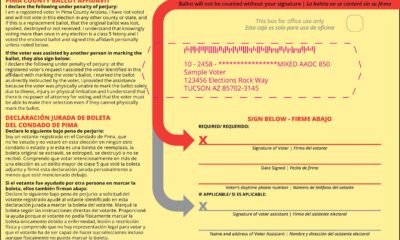arizona
AZ Republican Party Fuels Fear with Racist Lies as Election Season Heats Up

The Arizona Republican Party has initiated a provocative billboard campaign that starkly captures the troubling state of political discourse. The billboards contend that “only the GOP opposes eating kittens,” a statement that seems to belong in satire rather than serious political commentary.
AZGOP Chairwoman Gina Swoboda emphasized that the billboards are intended to underscore “disturbing stories” involving illegal immigrants, specifically targeting recent claims about behavior in Ohio that she labels a “sobering reminder of the stakes” in upcoming elections.
This initiative follows a resurgence of a bizarre narrative circulating on social media, particularly on X, formerly known as Twitter. Allegations emerged that Haitian immigrants in Springfield, Ohio, were reportedly stealing and consuming pet cats, as well as swans and ducks from local parks.
Adding fuel to the fire, Ohio U.S. Senator J.D. Vance amplified these claims on Sept. 8, linking the dubious reports to Vice President Kamala Harris. This narrative quickly gained traction among right-wing influencers and politicians, many of whom avidly adopted the story without verification.
However, the underlying truth is far removed from these sensational allegations. Local fact-checkers, including the Springfield News-Sun, traced the claims back to an unverified Facebook post that misrepresented third-hand information regarding a single cat incident. Local law enforcement and Springfield Mayor Rob Rue have asserted there are no credible reports to support these accusations against the local Haitian community.
The attempt by the Trump campaign and now the Arizona Republican Party to weaponize this false narrative reflects a broader trend within certain factions of the political landscape. The facts have become secondary to political gain, as lies and racially charged rhetoric are employed to influence voters.
This tactic symbolizes the impact of the Trump era on the Republican Party, where alternative facts dominate the discourse, and leaders persist in their refusal to engage in legitimate dialogue. As this situation unfolds, it highlights the precarious intersection of misinformation and political strategy.


















